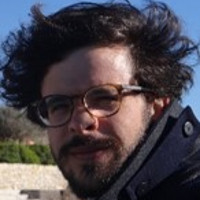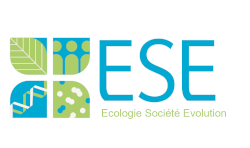
Timothée Fouqueray
Position: Doctoral Researcher
Detailed position: Doctoral Researcher
Team: Ecological trajectories and society
Contact details:
Laboratoire Écologie, Systématique, Évolution
Bât. 360, rue du Doyen André Guinier
91405 Orsay Cedex
Tel: –
Fax: –
Email: timothee.fouqueray (at) universite-paris-saclay.fr
Research interests
PhD project
PhD funded by the ENS de Lyon, doctoral school ABIES. Co-supervision by Nathalie Frascaria-Lacoste and Michel Trommetter.
2016 + > Adaptation to climate changes and biodiversity in forests: territorial strategies of French environmental conservation structures.
The PhD project focuses on the evolution of forestry practices. What is their long-term ecological viability? Do they maintain uses our societies make of forests? Interdisciplinarity helps connecting ecological, economic and social knowledges and theories in these analyses.
The starting point is the evolution of forestry practices in France since 1999’s storms. What changes are to be seen on regeneration, management and exploitation techniques? Based on the previous analysis, we try to disentangle the respective contributions of various economic, ecological and social criteria on these changes (for whom, for what ecosystem services or goods priorities?).
Once the drivers of practices changes are better defined, we will lean on a companion modelling (ComMod) approach so to distinguish how forest stakeholders could co-construct practices that verify both ecological viability/robustness to climate change and the maintenance of forest uses. Scenarization will incorporate governance, economic and climatic issues in the ComMod project.
2017 (first trimester) > Adaptation to climate changes and biodiversity. Managed coastal retreat: what are the socio-economic and ecological outputs of how ’freed zones’ are reinvested?
In a context of rising sea level, enhanced erosion rates and dramatic increase in frequence and intensity of hurricanes, one adaptation strategy consists in relocating human activities in the mainlands. However, freed coastal zones have not yet disappeared. How can they be reused in light, nature-friendly and economically incentivising projects that are sustainable (on all erosion, safety, economics and environmental dimensions)?
Act-Lab project, BASC LabEx
LabEx (French for ’Excellence Labs’) are 10-years projects with specific fundings for thematic research lines.
2016 + > Adaptation to climate changes and biodiversity: territorial strategies of environmental conservation structures.
This interdisciplinary research project aims at mapping climatic vulnerabilities and compare various action strategies to implement, so to better deal with an uncertain climatic future. The approach is based on a diversity of disciplines and field actors in order to associate life sciences, social sciences and local expertise.
Concretely, there are three sub-objectives:
i) Create a database sufficient enough to establish territorial diagnosis corresponding to environmental, economical, human, social and technical assets directly related to biodiversity uses. These diagnoses will help detecting vulnerability zones thanks to local climatic models.
ii) Implement, hand in hand with territorial stakeholders, one or more adaptation strategies relevant to the territorial climate changes based on the former diagnoses. Precisely, companion modelling workshops are to facilitate collective building of biodiversity-based solutions.
iii) A transverse method objective of inputing a research-action network for collecting and analysing the data. Interdisciplinarity will bring together ecology, ecological economics, and social sciences. This network will be an experiment and data-sharing place where prospective scenarii are to be commonly built. Such scenarii will be research tracks and are designed to later be tested. The network will also be a sharing place of knowledge and methods.
Career path
Education
2015- 2016 > SPES: Skills certificate (specificate French post-MSc diploma) of political sciences, strategy, environment at AgroParisTech.
Lessons (6 months) in patrimonial management, complex systems, ecological engineering, political sciences, strategy.
Internship (6 months): Setting up of a methodology to make relationships between biodiversity and human, social, technical, economical and ecological capitals explicit. Case study of French regional natural parks.
2014- 2015 > Second year of MSc Biosciences, École Normale Supérieure de Lyon. Biodiversity and biological resources.
Research project (4 months): Biodiversities affect the invasibility of human-introduced species in grasslands communities. Van Kleunen’s Laboratory, Universität Konstanz, Germany.
Research project (4 months): Fishing deep the tree of life. Bioanthropical approach of human worldwide impacts of fishing on coral reef fishes. ECOSYM-MARBEC, Montpellier. Article in progress.
2013 – 2014 > Gap year: Scientist and environmental sciences in public, private and political domains.
2012 – 2013 > First year of MSc Biosciences, École Normale Supérieure de Lyon. Ecology, statistics, adaptation, bioethics.
Research project (5 months) : Maternal Effects on Anogenital Distance in a Wild Marmot Population. Publication of a scientific article as first author in PLoS ONE. University of California, Los Angeles – Colorado, USA.
Holder of a qualification École Normale Supérieure de Lyon . Introduction in economics, cartography (QGis).
2011- 2012 > Bachelor’s degree in biology
École Normale Supérieure de Lyon. (university-level institution training teachers and researchers, entrance to which is based on a competitive exam). Attending Biology (Major) – Ecology, Biostatistics, Evolution.
2009 – 2011 > Preparative classwork BCPST, Tours.
Two-year intensive courses of Biology, Chemistry, Physics, Geology, English, German, Geography, Philosophy and Informatics.
2009 > Baccalauréat Scientifique with highest honors (equivalent A Levels)
Académie de Tours, in Maths, Physics, Chemistry, Biology, French, English, Geography, History. Special distinction in English (European section).
Related course experience
2019 > Organisation of the colloquium « Interdisciplinary PhD & professional future »
- « BASC-Our » project, funded by the LabEx BASC (3000€). Head of the project, co-heads Sarah Cogos et Pierre Chassé.
- Objective: describing doctoral practises of interdisciplinary PhD studies on environmental issues.
- Conference followed by a two-days doctoral workshop in the Île-de-France region.
2018 > Supervision of interns
- Lucile Génin, Sciences-Po Paris, « Organisational innovations in French forestry: volontuary carbon mitigation, a chance for private and public foresters?»
- Émile Huguet, École Polytechnique, Agroparistech, ’Climatic, social and economic parameterization of a serious game on forest adaptations to climate change’
2017 > Supervision of interns
- Antoine Charpentier, 2nd year of MSc in geography ’Bioterre – Paris 1 Panthéon La Sorbonne’, ’Climate change and the evolution of forestry: crossed study cases of adaptation practices in the Landes and in the Vosges’
- Victoria Soubeiran, 1st year of MSc in ecology ’BEE – Paris Sud’, ’Nature-based solutions: does promoting an utilitarian vision of biodiversity favor ecological engineering projects?’
2017, 2018 & 2019 > Teaching steering at AgroParisTech for the CLIMATE course module, in the Political Sciences, Ecology, Strategy education program
- 7 lessons organized
2013 –2014 > Gap year: three projects on the relationships Science and Society.
Laboratoire de Gestion des Écosystèmes et Environnements Forestiers Tropicaux (3 months) : analysis of the strategic évolution of international non governmental organizations in brazilian amazon. Montpellier.
Fondation pour la Recherche sur la Biodiversité (3 months) : Call for experts (écology, économics, sociology) on behalf of the French scientific secretary of the intergovernmental platform sciences-policies for biodiversity and ecosystem services. Paris.
Design office Biotope (3 months) : environmental evaluation and impacts studies (launch site Ariane 6, space centre of Kourou ; Approuague river; gold mine of Citron). Cayenne, French Guyana.
2014 (9 months) > Secretary of a think tank devoted to environmental issues made of students from the Ecoles Normales Supérieures and supported by the French Ministry of Foreign Affairs.
January 2013 > Co-organizer of the interdisciplinary symposium Sciences co-responsables (“Co-responsible sciences”) at the Ecole Normale Supérieure de Lyon, France.
http://sciences-coresponsables.ens-…
Publications
Peer-reviewed articles
Fouqueray T, Trommetter M, Frascaria-Lacoste N, 2018. Managed retreat of settlements and infrastructures: Ecological restoration as an opportunity to overcome maladaptive coastal development in France. Restoration Ecology. doi: 10.1111/rec.12836
Feng Y, Fouqueray T, van Kleunen M, 2018. Linking Darwin’s naturalisation hypothesis and Elton’s diversity–invasibility hypothesis in experimental grassland communities. Journal of Ecology. https://doi.org/10.1111/1365-2745.13061
Bertrand, F., Fouqueray, T., 2017. A French regional natural park on a learning curve: insights from an approach of adapting biodiversity conservation to climate change, Norois. Environnement, aménagement, société, 245, 47–61. doi: 10.4000/norois.6224. (In French)
Fouqueray, T. D., Blumstein, D. T., Monclús, R., Martin, J. G. A., 2014. Maternal Effects on Anogenital Distance in a Wild Marmot Population, PLOS ONE, 9, 3, e92718. doi: 10.1371/journal.pone.0092718.
Book chapters
Fouqueray T, Charpentier A, Trommetter M, Frascaria-Lacoste N, 2018. Is Adaptation to Climate Change Threatening Forest Biodiversity? A Comparative and Interdisciplinary Study Case of Two French Forests, in Handbook of Climate Change and Biodiversity. https://doi.org/10.1007/978-3-319-98681-4
Talks
January 2019 – Strasbourg University, Strasbourg, France.
April 2018 – World Symposium on Climate Change and Biodiversity, Manchester, UK.
January 2018 – GIP Ecofor, Paris, France.
Octobre 2017 – 1st year sum up (in French) at Laval University, Québec, Canada.
